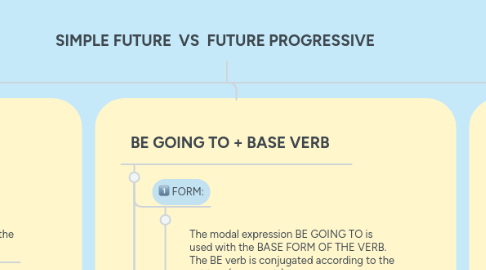
1. WILL + BASE VERB
1.1. FORM:
1.1.1. The future modal WILL is used whit the BASE FORM OF THE VERB.
1.2. USE:
1.2.1. This form is used when you are deciding future plans at the moment. WILL + BASE VERB to be more formal than BE GOING TO + BASE VERB
1.3. EXAMPLE:
1.3.1. Do you want to go play in the park later? Sure, I´ll go! He will do what the teacher says abaut homework
2. BE GOING TO + BASE VERB
2.1. FORM:
2.1.1. The modal expression BE GOING TO is used with the BASE FORM OF THE VERB. The BE verb is conjugated according to the subject ( am, are, is).
2.2. USE:
2.2.1. This form is used when plans have already been made in advance. BE GOING TO + BASE VERB is considered to be more casual than WILL + BASE VERB.
2.3. EXAMPLE:
2.3.1. They are going to swim next weekend. He is going to talk all night with his cousin.
2.4. HERALDIN FABIOLA ESPINDOLA VARGAS
3. FUTURE PROGRESSIVE
3.1. FORM:
3.1.1. WILL + BE + ING VERB. The future progressive is formed by taking MODAL WILL, the BASE FORM OF THE VERB BE.
3.2. USE:
3.2.1. The function of the future progressive is to show A CONTINUING (LONG) ACTION GETTING INTERRUPTED BY A SHORT FUTURE ACTION.
3.3. EXAMPLE:
3.3.1. He will be bathing while I cook. Will be doing homework when the power goes out.
